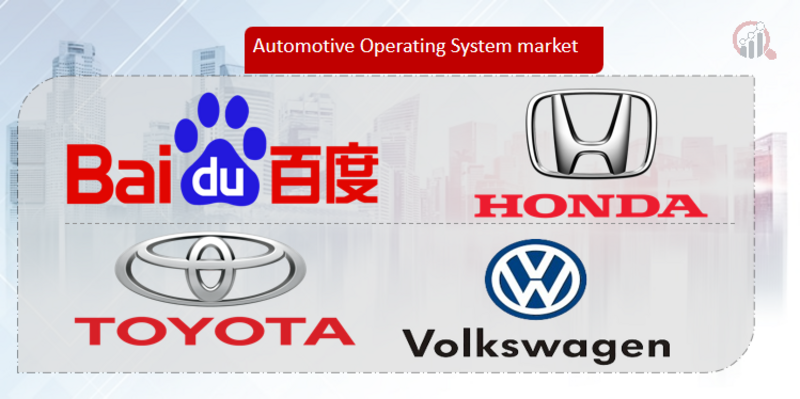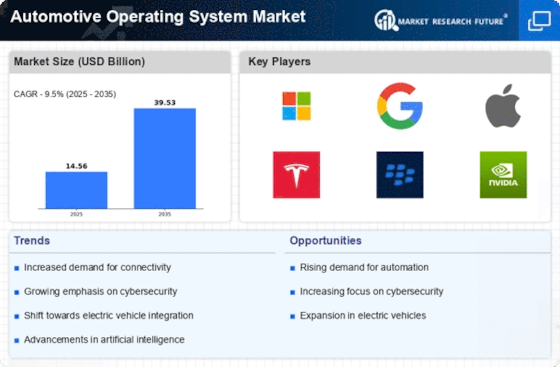Top Industry Leaders in the Automotive Operating System Market
 *Disclaimer: List of key companies in no particular order
*Disclaimer: List of key companies in no particular order
Top listed global companies in the Automotive Operating System industry are:
Baidu Inc.
Lyft
Mercedes-Benz
Honda Motor Co., Ltd.
Chevrolet
Toyota Motor Corporation
Volkswagen Group
General Motors
BMW AG
Bridging the Gap by Exploring the Competitive Landscape of the Automotive Operating System Top Players
The automotive operating system (OS) market is revving up, fueled by the surge in connected cars, electric vehicles (EVs), and autonomous driving aspirations. This dynamic landscape is rife with established players jostling for dominance alongside new entrants carving their niches. Let's navigate the key strategies, trends, and factors shaping this burgeoning battleground.
Key Players, Diverse Strategies:
Traditional Powerhouses: Blackberry's QNX holds the pole position, deeply entrenched in infotainment and safety systems with a focus on reliability and security. Linux, championed by Genivi Alliance, is making inroads in instrument clusters and telematics, driven by its open-source flexibility.
Tech Giants Leap In: Google's Android Automotive OS is quickly gaining traction, leveraging its familiar smartphone experience and vast app ecosystem. Apple's CarPlay and iOS in the Car offer seamless integration with their existing user base, aiming for a premium in-car experience.
Emerging Challengers: Startups like Blackberry's IVY and Bosch's Micra OS are targeting specific niches, focusing on cloud-based services and secure data management. Chinese tech giants like Baidu and Alibaba are also pushing their own OS versions, vying for dominance in their domestic market.
Navigating Market Share Analysis:
OS Type: The battle lines are drawn across QNX, Linux, Android, and others. Market share analysis demands considering not just overall penetration but also specific application dominance. For example, QNX might lead in safety systems, while Android shines in infotainment.
Vehicle Type: Passenger cars and commercial vehicles present distinct dynamics. Electric vehicles, with their complex battery management and charging needs, are pushing for specialized OS solutions tailored to their unique requirements.
Regional Play: Market share varies significantly across geographies. The US and Europe favor QNX and Linux, while Android sees rapid adoption in Asia. Regional alliances and partnerships play a crucial role in influencing adoption rates.
New Trends, Emerging Strategies:
Open-Source Collaboration: Increased collaboration between companies like Genivi and AGL are fostering open-source platforms, driving down development costs and accelerating innovation.
Software Over Hardware: The focus is shifting from specialized hardware to software-defined vehicles, enabling remote over-the-air updates and faster adaptation to changing needs.
Security & Data Privacy: As connected cars become data hubs, robust security measures and transparent data ownership models are becoming paramount competitive differentiators.
Overall Competitive Scenario:
The automotive OS market is a boiling pot of established players, tech giants, and innovative startups. While QNX retains a stronghold, Android's rapid growth and the rise of niche players are keeping the competition fierce. Open-source platforms, software-defined vehicles, and data security are emerging battlegrounds. Adaptability, strategic partnerships, and a focus on specific market segments will hold the key to success in this ever-evolving landscape.
Latest Company Updates:
Baidu Inc.
- Apollo 7.0: Released in November 2023, Apollo 7.0 focuses on improved perception, planning, and driving capabilities for autonomous vehicles. It also includes features like high-definition map support and cloud-based remote driving assistance. (Source: Baidu Apollo website)
Mercedes-Benz
- MBOS (Mercedes-Benz Operating System): Announced in 2021, MBOS is a centralized software platform for future Mercedes-Benz vehicles. It will handle various functions like infotainment, driver assistance, and vehicle dynamics. The first MBOS-equipped vehicles are expected in 2024. (Source: Mercedes-Benz website)
Honda Motor Co., Ltd.
- Honda Sensing 360: This suite of advanced driver-assistance systems (ADAS) includes features like automatic emergency braking, lane departure warning, and adaptive cruise control. Honda Sensing 360 is being gradually rolled out across its car lineup. (Source: Honda website)
Chevrolet
- Super Cruise: Chevrolet's hands-free driver assistance system for highways. It uses LiDAR sensors and high-definition maps to enable semi-autonomous driving on compatible roads. (Source: Chevrolet website)










